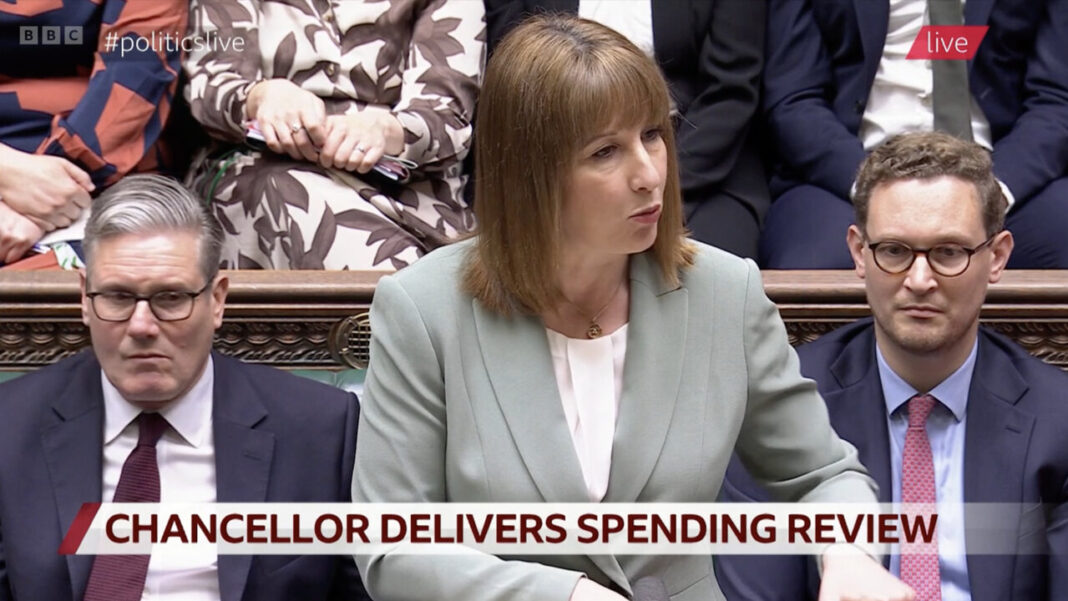Chancellor Rachel Reeves delivered her first Spending Review to Parliament yesterday, setting out long-term departmental budgets and pledging to deliver “renewal” that will be felt in the everyday lives of working people across the UK.
Speaking in the House of Commons, Reeves said: “We are renewing Britain – but I know that too many people in too many parts of our country are yet to feel it.”
She described the Spending Review as a tool to deliver real change in jobs, public services, and communities, including on high streets that have suffered years of decline.
The Chancellor committed to growing the economy “so that working people are better off”, while also strengthening national security and the NHS.
HOUSING BOOST
In one of the most striking announcements of her statement, Reeves said the government would deliver the biggest cash injection into social and affordable housing in 50 years – including specific funding for homes at social rent.
This move, which the Chancellor claimed was worth £39bn over the next decade, marks a significant policy shift following years of limited central government support for council housing.
Reeves also announced a loosening of infrastructure investment rules in a bid to unlock greater economic development.
She confirmed that £10 billion would be made available for financial investments, including through Homes England, in an effort to attract further private sector funding into housing and regeneration projects.
“This is about building not just homes, but stronger communities and opportunities,” she said.
The Spending Review outlines departmental allocations for the years ahead and is expected to underpin much of the government’s domestic agenda.
INDUSTRY REACTION

Tim Foreman, Managing Director of Land and New Homes, LRG, says: “The additional funding for affordable housing is very welcome especially as the demand for affordable housing, and cost of building it, continues to increase.
“However, delivery of affordable housing would benefit from addressing a wider range of types and tenures than the government is currently providing for. Specifically, shared ownership plays a very important role in getting people on to the housing ladder and yet seems to have been largely ignored by this government.
“The popularity of shared ownership is increasing, partly because today’s first-time buyers are paying almost a third more to get on the property ladder than they were five years ago. Furthermore, in the last decade the number of private renters moving into home ownership fell by 23%.
“The government’s stance on affordability is making it harder for first-time buyers.”
“The government’s current stance on housing affordability – not least the increases in Stamp Duty and the freezing of Lifetime ISAs – has resulted in policies that are making it even harder for first time buyers to enter the market.
“Shared ownership deserves the same level of government-assisted marketing as benefited the now defunct Help to Buy scheme and it seems detrimental to the whole ‘growth agenda’ that the government is ignoring this important tenure.
MORE BOOTS ON THE GROUND NEEDED
 Jeremy Leaf, north London estate agent and a former RICS Residential Chairman, says: “The additional funding of £39 billion for social and affordable housing and easing of borrowing rules is of course very welcome but what we want to see is more ‘boots on the ground’ – and asap.
Jeremy Leaf, north London estate agent and a former RICS Residential Chairman, says: “The additional funding of £39 billion for social and affordable housing and easing of borrowing rules is of course very welcome but what we want to see is more ‘boots on the ground’ – and asap.
“The acute shortage of energy-efficient affordable homes for sale and to rent prompted the government to set high building targets soon after it came into office.
“We don’t believe we’ve ever encountered such unanimity among the main parties in over 30 years of trading particularly as it’s so often political disagreements that get in the way of development.
“We would love to hear the Government taking greater advantage of that almost unanimous agreement on how to fix the housing crisis.
“Governments cannot tell housebuilders when and how much to build but can make it easier for them to gain deliverable consents for certain types of property or companies – such as SMEs. For instance, the government could encourage more supply of energy-efficient, affordable homes of quality, initially on publicly-owned land, offering incentives to other landowners to release and accelerate delivery of previously-consented sites.
“Many housebuilders have unsold plots of land but will only build at the rate they can sell – preferably without having to reduce prices – while absorbing building costs and shortage of skilled workers.
“As a result, the £1.2 bn to be invested in ‘training and upskilling’ young people is good news. Economic growth is another significant contributor to housebuilder confidence but of course there’s no guarantees there either.
“Progress is being made with housebuilding but we would also want to hear that planning and delivery numbers are being checked regularly to see if they’re meeting aspirations and, if not, taking further action as necessary.
“It’s not just about building more but also making better use of existing resources.”
“We often find it’s the peripheral decisions such as planning conditions, infrastructure, legal sign-off, capacity etc which are just as important, especially as so many Local Plans are out of date.
“We must not forget – it’s not just about building more but also making better use of existing resources including the large number of short and long-term empty properties.
“A 7/10 for content today which will definitely rise to 8/10 at least if we see more progress on the ground in reaching as close as possible to that ambitions 350,000 a year target.”
WE NEED MEANINGFUL ACTION

Allison Thompson, National Lettings Managing Director, LRG (Leaders Romans Group), says: “To ease pressure across the housing system, the government must do more to keep existing rental homes available, not just promise new ones.
“With a shortage of social rent properties, the private rented sector is doing the heavy lifting; however, with more tenants looking and fewer homes to let, that gap is becoming harder to fill. Councils in England spent £2.29 billion on temporary accommodation between April 2023 and March 2024, a 29% increase on the previous year.
“How much more will that rise while the government focuses on incentivising new development instead of supporting the homes we already have?
“At the same time, the cost of providing rental housing continues to increase. These pressures are ultimately felt by tenants, who are paying more and finding it harder to secure a suitable home.
“The Renters’ Rights Bill adds further uncertainty, and there is still no targeted support to help landlords upgrade properties ahead of the expected EPC changes in 2030.
“Without meaningful action to stabilise the private rented sector, the gap between housing need and housing access will only widen.”
RENTAL SECTOR WILL GROW

Brendan Geraghty, Chief Executive of the Association for Rental Living, says: “The Association for Rental Living broadly welcomes the investment in infrastructure and a new Affordable Homes Programme announced by the Chancellor as part of the Spending Review 2025.
“Whilst no direct support for the Build to Rent sector was announced, we welcome the Government’s ongoing commitment to delivering the target total 1.5 million homes and the £39bn of funding for social and affordable homes which, together with Build to Rent, play an essential role in mixed tenure housing supply.
“The Rental Living Sector will only grow and thrive due to the social and physical improvements intended in this Spending Review and the Sector is ready to play its part in facilitating that change by providing high quality, professionally managed homes for rent across the country.”
HOUSEBUILDING BOOST

Alex Slater, Rightmove’s Housebuilding Expert, says: “This news is a really positive boost for the housebuilding industry and a step in the right direction.
“There aren’t enough affordable homes, so we welcome any initiatives that will help the sector to deliver more of these homes to market.
“What will be key is making sure more affordable homes are delivered in the right places, where the gap in supply and demand is greatest. Hopefully this is one of many steps to come to support the delivery of much needed homes across the country.”
CIVIL COURTS NEED FUNDING

Dr Neil Cobbold, Commercial Director of Reapit, says: “It is encouraging to see the Chancellor commit £39bn to deliver affordable housing over the next 10 years.
“The investment in training and apprenticeships for builders and electricians is also welcomed, along with £10bn for Homes England.
“We hope these funds will help build the 1.5 million new homes the government has committed to delivering over this parliament.
“However, it is disappointing to see no additional funding outlined for the civil courts and tribunal system, which need long-term investment, especially with the Renters’ Rights Bill due to see more tenants and landlords in court and tribunal cases in the following years.”
RIGHT HOMES, RIGHT PLACES

Timothy Douglas, Head of Policy and Campaigns at Propertymark, says: “Investment in rejuvenating places up and down the country is welcome and ensures that people live, work and want to move into vibrant communities.
“Propertymark also welcomes additional funding for affordable and social homes as we know this will help meet the UK Government’s ambitious housing target and have the knock-on effect of bringing down the cost of renting in the private rented sector.
“Planning reforms must also work alongside a housing strategy which is much anticipated to be published by the UK Government to ensure we are building the right homes in the right places, and we can meet housing need up and down the country.”
SIGNIFICANT MOVE

Colin Brown, Head of Planning & Development, Carter Jonas, says: “On the face of it, this is a very significant move by the Chancellor to bolster the delivery of affordable housing and the sector will widely welcome it.
“It will help unlock sites and aid the delivery of private housing as legal agreements typically seek to align the delivery of market and affordable housing.
“There remains a pressing need however to utilise some demand-side levers as well to encourage home ownership such as a return to Help to Buy.
“Of course, there are also ongoing concerns about local government funding and general skills availability to build the homes the country needs.”
ONE STEP CLOSER

Andrew Lloyd, Managing Director at Search Acumen, says: “After years of underinvestment, it’s really pleasing to see a commitment from Government to ease the strain on the affordable and social housing sector, and it will take us one step closer to meeting our ambitious housing and constructions targets.
“But in order to ensure this investment delivers tangible results, more needs to be done to rethink the way social housing portfolios are transacted by real estate lawyers and housing associations at the heart of this process.
“The missing piece of the puzzle is harnessing the power of new technologies, since modernising archaic, paper-reliant processes that continue to slow down property transactions will have an immediate impact on boosting deal flow across all property sectors.”
MISSED OPPORTUNITY

Andy Jones, Group Director of Corporate Sales, Lettings & BTR at LRG, says: “While the considerably increased funding for affordable housing is welcomed and will help provide a boost to new homes and affordable housing development, from a property investment perspective I feel that the Chancellor has missed an opportunity to tackle the development viability crisis which is another important part of the jigsaw.
“Without urgent intervention to tackle the real-world constraints choking housing delivery, particularly in Build to Rent (BTR) and regen schemes, government ambitions will remain out of reach.
“Despite rhetoric around growth, there is still no clear recognition that many housing developments that were viable just five years ago are now stalled. Interest rates, stubbornly high construction costs, highlighted in the BCIS cost index for continued inflation in core construction costs and a plethora of new taxes and regulatory hurdles (specifically new building safety regulations) have combined to choke viability, especially in areas with lower land values.
“High-density schemes and regeneration projects, which are so often essential to delivering housing targets, have been hit hardest.
“We cannot talk seriously about unlocking housing or reviving growth without confronting this reality.”
“That requires the government to take bold action to reduce upfront costs, provide greater certainty over tax and regulation and speed up the planning and infrastructure that underpins delivery.
“The industry is desperately in need of measures to address mounting delays from the Building Safety Regulator and the under-resourcing of planning departments. These are real-world bottlenecks which investors face every day, and which the government could relieve immediately with the right focus.
“The industry will continue to lobby for the return of Multiple Dwellings Relief for Build to Rent, which is particularly necessary in lower value areas where it supported regeneration and housing delivery.
“Its abolition has made viable schemes unviable – and no serious plan to support rental delivery can ignore that fact.”
Its abolition has made viable schemes unviable – and no serious plan to support rental delivery can ignore that fact. There is quantitative analysis showing reduced viability of Build to Rent projects post MDR abolition.
“We welcome the Government’s stated commitment to tax certainty – but it must go further. Build to Rent and modular housing (MMC), for instance, need clearer VAT treatment and better support to achieve scale.
And across the board, we need fewer, not more, untested levies and obligations at the start of the development process. NHBC foundation research shows slow uptake of MMC partly due to tax and regulatory uncertainty.
“If we are to meet housing targets, regenerate brownfield land, and drive real economic growth, viability can no longer be the elephant in the room. The property industry stands ready to deliver – but only if Government is prepared to work with us on the fundamentals.
WE NEED A CLEAR STRATEGY

Lawrence Turner, Director, Boyer (an LRG company), says: “Florence Eshalomi MP rightly stated that today’s Spending Review is “make or break” for fulfilling the Government’s pledge to build 1.5m homes over the course of Parliament.
“Without this afternoon’s seismic announcement of a £39 billion investment in affordable housing, it was highly probable that the Government would not have even reached halfway towards achieving its housing targets.
“We now have some hope that this ambitious target could become a reality, rather than just a distant goal. However, to build 1.5m homes, the Government needs to now focus on three areas.
“Firstly, it is essential that the promised investment is strategically channelled; not solely to housing associations to buy up the affordable allocation on private developments, but also to local authorities’ planning departments.
“These departments have been stretched thin due to historic lows in Government funding since the austerity years.”
These departments have been stretched thin due to historic lows in Government funding since the austerity years. Local authorities need to have sufficient resources and expertise to determine planning applications swiftly and efficiently, and ensure homes are delivered on the ground.
“Secondly, given the ongoing cost-of-living crisis, additional stimulus measures are needed to support the housing market. Rising mortgage costs and inflationary pressures have reduced sales rates, particularly for first time buyers.
TURBO-CHARGE HOUSEBUILDING
While this year’s planning reforms have been welcomed, many in the industry have been calling for the return of Help to Buy to stimulate the market; and in Kier Starmer’s own words “turbo-charge house building.”
“Finally, the Government needs to win support from local communities for new housing developments, particularly in rural areas that often do not feel the impacts of the housing crisis first hand.
“Much of the new strategic housing growth will be planned close to our towns and cities, often in more rural areas. The Government needs a strategy to clearly communicate to these communities why tackling the housing crisis is urgently needed and to demonstrate the long-term benefits that accompany new housing developments for communities.
MODERNISE DIGITAL INFRASTRUCTURE

Maria Harris, Chair of the Open Property Data Association, says: “The commitment of £39bn to social and affordable housing marks a critical step in addressing the UK’s deepening housing crisis.
“But to make that investment count, the Government must also modernise the digital infrastructure that underpins our housing market.
“The £39bn must be matched by bold reform.”
“Recent communications from MHCLG reaffirming plans to digitise the home buying and selling process, including better data sharing and digital ID services, are welcome but we must accelerate the process.
“The current property transaction process remains fragmented, slow and prone to failure. It adds cost and uncertainty for consumers and drags on productivity for industry. Digitisation is not a ‘nice to have’ but an essential pillar of a fit-for-purpose, functioning housing market.
“By embedding open standards, smart data and seamless digital handovers between buyers, sellers, agents and conveyancers, we can cut fall-throughs, speed up transactions and build trust. The £39bn must be matched by bold reform. Investing in supply without fixing infrastructure is like building homes on sand.”









